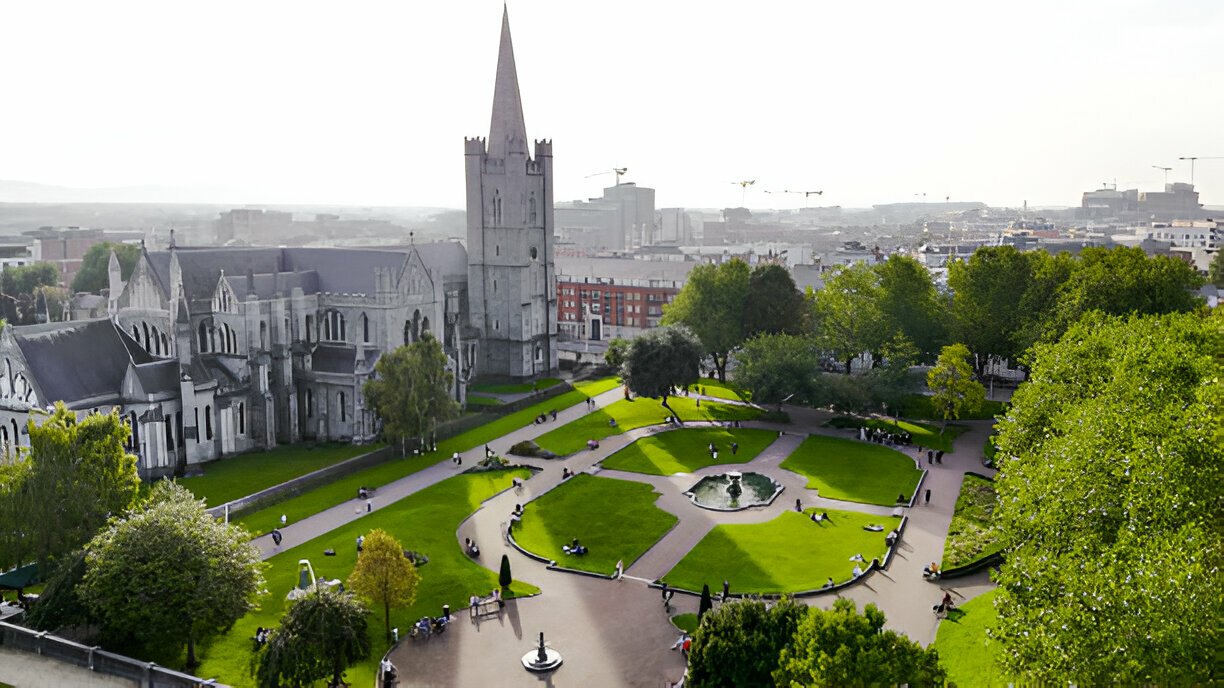Ireland, known as the Emerald Isle, has long captivated hearts with its rolling green hills, rugged coastlines, lively culture, and rich heritage. For many, the idea of moving to Ireland feels like an enchanting dream. But what if you could get paid to make that dream a reality? Believe it or not, Ireland offers financial incentives to people willing to relocate to its rural towns and islands.
This guide How to Get Paid to Move to Ireland will show you how to take advantage of these unique programs, explain why Ireland is introducing these initiatives, and provide key details on eligibility, benefits, and the application process. By the end, you’ll have a specific roadmap for turning your Ireland relocation into a life-changing adventure.
Why Ireland is Paying People to Move
Ireland’s efforts to attract newcomers stem from a critical issue affecting many of its rural regions: population decline. Over the years, younger generations have moved to urban centers or emigrated abroad, leaving behind aging populations and diminishing economies in once-thriving rural towns.
To combat this trend, the Irish government, regional development groups, and private organizations have launched a series of relocation incentives. These programs aim to revitalize Ireland’s countryside by attracting remote workers, entrepreneurs, skilled professionals, and even Irish descendants eager to reconnect with their roots.
The revitalization efforts are twofold. On the one hand, they breathe new life into local economies by introducing new residents, businesses, and spending power. On the other hand, they help preserve Ireland’s cultural identity and traditions by fostering active, sustainable communities in rural areas.
Key Programs That Pay You to Move to Ireland

Several enticing programs are available to anyone considering a move to Ireland. Here’s a closer look at the main initiatives offering financial assistance and support:
Our Living Islands Policy
Launched in 2023, the Our Living Islands initiative supports people moving to remote offshore Irish islands. Its goal is to bolster the population and economy of these unique communities. Key benefits include grants of up to €84,000 to help restore traditional homes, covering repairs, refurbishments, and modernization.
This program is ideal for adventurous individuals or families ready to live a quieter life amid spectacular landscapes. It even offers additional support to help new residents integrate with their island communities.
Remote Work Incentives
Ireland has positioned itself as a global hub for remote workers. With stunning countryside, tranquil living spaces, and unparalleled charm, it’s no wonder rural Ireland is becoming a hotspot for digital nomads. Government funding provides infrastructure to towns welcoming remote workers, including high-speed internet installations and the development of co-working hubs.
Remote workers settling in select regions may also qualify for grants and other supports, making the transition even smoother.
Startup and Innovation Grants
Through organizations like Enterprise Ireland, the Irish government encourages entrepreneurs and digital nomads to move, start businesses, and contribute to local economies. Programs like Startup Ireland offer grants, business mentoring, and tax incentives to foster innovation and launch new enterprises.
Regional development groups are also offering relocation schemes in targeted areas where economic renewal is a priority. These initiatives provide funding for startups, as well as schemes tailored to attract skilled workers in high-demand industries.
What Jobs Can I Do When I Move to Ireland?

Healthcare Jobs
Ireland has a strong demand for nurses, doctors, and healthcare assistants.
Hospitals and private care homes often hire foreign professionals.
Visa sponsorship is available for many medical roles.
This sector offers long-term stability and competitive pay.
It’s ideal if you have experience and relevant qualifications.
Tech and IT Jobs
Ireland is a European tech hub with companies like Google and Apple.
Skilled workers in software, data, and cybersecurity are highly sought after.
Many roles qualify for a Critical Skills Employment Permit.
You can work in major cities or remotely in rural areas.
Salaries are high, and growth potential is strong.
Remote Freelance Work
If you work online, you can live in Ireland and keep your job.
Writers, designers, marketers, and developers thrive as digital nomads.
Many rural towns now offer fast internet and co-working spaces.
You’ll need to manage your own taxes and residency status.
It’s a flexible option with location freedom.
Hospitality and Tourism
Ireland’s hotels, restaurants, and tourist spots hire all year round.
Jobs include chefs, waiters, receptionists, and cleaning staff.
Some employers offer free accommodation and meals.
These roles are common in both cities and rural areas.
Experience helps, but entry-level jobs are available too.
Public Sector Jobs
Government roles include admin, clerical, and teaching positions.
These jobs offer stable income, benefits, and pensions.
You’ll need valid work permits and relevant qualifications.
Most listings are posted on PublicJobs.ie.
It’s a great choice if you want long-term security.
Seasonal and Part-Time Jobs
Ireland offers short-term jobs during farming and tourism seasons.
Common roles include fruit picking, shop work, and hotel staff.
These are ideal for students or temporary residents.
Some jobs include accommodation and meals.
They’re easy to find and don’t always need experience.
Teaching Jobs
Qualified teachers can work in schools or language institutes.
TEFL-certified educators can teach English across Ireland.
There’s high demand in both cities and rural towns.
Check EducationPosts.ie for open positions.
It’s a meaningful job if you enjoy helping others learn.
Creative and Artistic Work
Ireland supports artists, writers, and musicians with funding and spaces.
You can apply for grants through the Arts Council.
Freelance creatives can also work in digital art and design.
Join local events or sell your work online.
It’s perfect if you’re passionate about the arts.
What You Can Receive
Choosing one of these programs doesn’t just save you money; it also provides several unique benefits. Here’s what you can expect:
- Financial Grants: Programs like Our Living Islands offer significant funding, including up to €84,000 to help purchase and restore housing.
- Tax Incentives: Entrepreneurs can benefit from tax breaks tied to specific initiatives.
- Infrastructure Support: Co-working hubs, reliable broadband networks, and local government assistance make it easier for professionals to work remotely or launch businesses.
- Additional Perks: Some programs may offer housing subsidies, child benefits, or additional financial aid depending on your circumstances.
These benefits aim to lower the financial barriers for anyone relocating while ensuring you receive the necessary tools to thrive in your new community.
Who is Eligible
The relocation programs in Ireland are tailored to specific groups, but the eligibility criteria are broad enough to encourage participation from various demographics. You may qualify if you fall into one of the following categories:
- Remote Workers: Freelancers, digital nomads, and employees working remotely are highly sought after.
- Entrepreneurs: Those with plans to start a business in Ireland are supported through enterprise grants and other funding programs.
- Irish Citizens Returning Home: Irish citizens or descendants living abroad, looking to reconnect with their heritage, are particularly welcome.
- EU Citizens: EU citizens enjoy easier eligibility for these programs due to freedom of movement regulations.
- Non-EU Citizens with Work Visas: If you’re outside the EU, securing a visa is essential, but it can be part of the application process.
How to Apply
Applying for these programs might seem daunting at first, but following a clear process can simplify the steps. Here’s how to get started:
- Research Programs: Identify the relocation initiative most aligned with your goals, whether that’s Our Living Islands, enterprise grants, or remote work incentives.
- Choose Your Destination: Consider which rural town, village, or island suits your desired lifestyle. Consider the community’s size, amenities, and natural surroundings.
- Prepare a Relocation Plan:
- Outline your intentions, whether they involve remote work, starting a business, or restoring property.
- If applying for grants, include a detailed proposal explaining how funds will be allocated.
- Meet Visa Requirements (if applicable): Non-EU citizens should familiarize themselves with Ireland’s visa application process to ensure they meet all legal requirements.
- Submit Your Application: Follow the specific guidelines of your chosen program. This may include providing supporting documents, financial records, or verification of your professional work.
Living in Rural Ireland: What to Expect
Moving to rural Ireland comes with countless rewards, but it also requires an adjustment to a slower pace of life. Here’s a preview of what to expect once you’ve relocated:
Pros
- Breathtaking Scenery: From dramatic cliffs to lush fields, every view doubles as a postcard.
- Strong Community Ties: Close-knit neighborhoods foster meaningful connections and support systems.
- Low-Stress Living: A slower, quieter lifestyle awaits your escape from urban chaos.
Cons
- Weather: Ireland’s weather can be unpredictable and damp, requiring an appreciation for rainy days.
- Access to Services: Rural areas may have limited access to healthcare and certain amenities.
- Cultural Adjustment: It can take time to adapt to rural customs and traditions.
Tips for Integration
- Get involved in community activities like local festivals or volunteer opportunities.
- Explore local outdoor activities such as hiking trails, fishing, or surfing.
- Stay connected with your new neighbors by participating in local events and markets.
Alternatives: Other Countries That Pay You to Move
Ireland isn’t the only country enticing newcomers with relocation offers. Some other programs include:
- Italy offers monetary incentives for moving to picturesque villages in regions like Molise.
- Portugal supports digital nomads through tax breaks and co-living spaces.
- Spain and Greece have initiatives for repopulating villages.
While these countries share similarities, Ireland stands out with its unparalleled culture, charm, and warm welcome for newcomers.
Make Ireland Your Home
If the idea of getting paid to live amidst Ireland’s stunning landscapes and vibrant culture feels like a once-in-a-lifetime opportunity, now is the time to take action. With grants, tax incentives, and community support, relocating to Ireland has never been more accessible.
Start your research, prepare your application, and take those first steps toward your new Irish adventure. Soon, you’ll be enjoying cobblestone streets, cozy pubs, and a welcoming community all while living out the Irish dream.
FAQs About How to Get Paid To Move To Ireland
How much money can I get for moving?
Depending on the program, you may receive grants ranging from €20,000 to €84,000. This money is often meant to renovate vacant homes, start a business, or support relocation costs.
What is the “Our Living Islands” scheme?
This is a government plan to repopulate Ireland’s offshore islands. Eligible applicants may get up to €84,000 to refurbish a vacant home and move there permanently.
Can families apply, or is this only for individuals?
Yes, families can apply. Many towns prefer families because it helps grow the local community and school enrollment. Each program may have different requirements.
Can I start a business and get paid to move?
Yes, Ireland offers support for entrepreneurs through Local Enterprise Offices. If you’re starting a business in a rural area, you may qualify for funding, advice, and relocation help.
Is the money given as a grant or a loan?
Most relocation payments are grants, not loans. That means you don’t have to repay them, but you must follow the rules, such as living in the area for a certain number of years or completing renovations.
Hi there. My name is Abbas Khan. I’m passionate about finding smart ways to save and make money from anywhere in the world.
Learning how to earn remotely and manage my finances gave me true freedom, and now I want to help you do the same.
Join me as I explore money-saving hacks, income ideas, and tips to build a flexible, location-independent lifestyle you’ll love.

